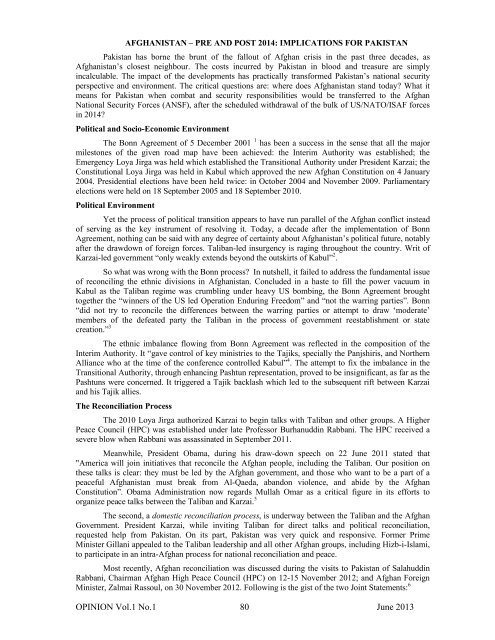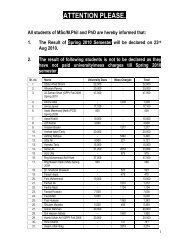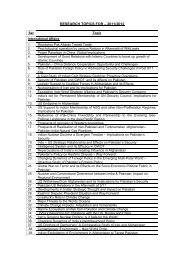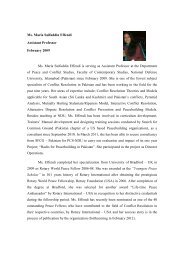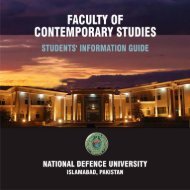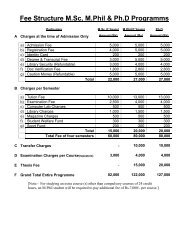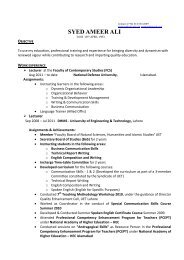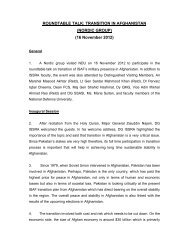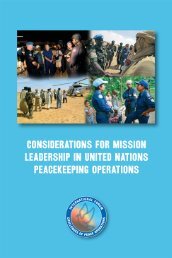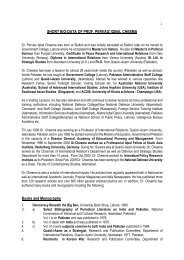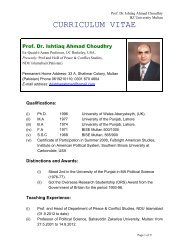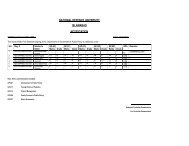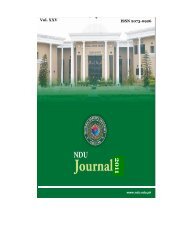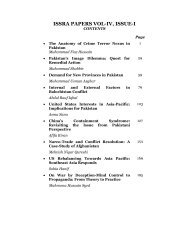OPINION Vol.1, No.1 June 2013 - National Defence University
OPINION Vol.1, No.1 June 2013 - National Defence University
OPINION Vol.1, No.1 June 2013 - National Defence University
Create successful ePaper yourself
Turn your PDF publications into a flip-book with our unique Google optimized e-Paper software.
AFGHANISTAN – PRE AND POST 2014: IMPLICATIONS FOR PAKISTAN<br />
Pakistan has borne the brunt of the fallout of Afghan crisis in the past three decades, as<br />
Afghanistan’s closest neighbour. The costs incurred by Pakistan in blood and treasure are simply<br />
incalculable. The impact of the developments has practically transformed Pakistan’s national security<br />
perspective and environment. The critical questions are: where does Afghanistan stand today What it<br />
means for Pakistan when combat and security responsibilities would be transferred to the Afghan<br />
<strong>National</strong> Security Forces (ANSF), after the scheduled withdrawal of the bulk of US/NATO/ISAF forces<br />
in 2014<br />
Political and Socio-Economic Environment<br />
The Bonn Agreement of 5 December 2001 1 has been a success in the sense that all the major<br />
milestones of the given road map have been achieved: the Interim Authority was established; the<br />
Emergency Loya Jirga was held which established the Transitional Authority under President Karzai; the<br />
Constitutional Loya Jirga was held in Kabul which approved the new Afghan Constitution on 4 January<br />
2004. Presidential elections have been held twice: in October 2004 and November 2009. Parliamentary<br />
elections were held on 18 September 2005 and 18 September 2010.<br />
Political Environment<br />
Yet the process of political transition appears to have run parallel of the Afghan conflict instead<br />
of serving as the key instrument of resolving it. Today, a decade after the implementation of Bonn<br />
Agreement, nothing can be said with any degree of certainty about Afghanistan’s political future, notably<br />
after the drawdown of foreign forces. Taliban-led insurgency is raging throughout the country. Writ of<br />
Karzai-led government “only weakly extends beyond the outskirts of Kabul” 2 .<br />
So what was wrong with the Bonn process In nutshell, it failed to address the fundamental issue<br />
of reconciling the ethnic divisions in Afghanistan. Concluded in a haste to fill the power vacuum in<br />
Kabul as the Taliban regime was crumbling under heavy US bombing, the Bonn Agreement brought<br />
together the “winners of the US led Operation Enduring Freedom” and “not the warring parties”. Bonn<br />
“did not try to reconcile the differences between the warring parties or attempt to draw ‘moderate’<br />
members of the defeated party the Taliban in the process of government reestablishment or state<br />
creation.” 3<br />
The ethnic imbalance flowing from Bonn Agreement was reflected in the composition of the<br />
Interim Authority. It “gave control of key ministries to the Tajiks, specially the Panjshiris, and Northern<br />
Alliance who at the time of the conference controlled Kabul” 4 . The attempt to fix the imbalance in the<br />
Transitional Authority, through enhancing Pashtun representation, proved to be insignificant, as far as the<br />
Pashtuns were concerned. It triggered a Tajik backlash which led to the subsequent rift between Karzai<br />
and his Tajik allies.<br />
The Reconciliation Process<br />
The 2010 Loya Jirga authorized Karzai to begin talks with Taliban and other groups. A Higher<br />
Peace Council (HPC) was established under late Professor Burhanuddin Rabbani. The HPC received a<br />
severe blow when Rabbani was assassinated in September 2011.<br />
Meanwhile, President Obama, during his draw-down speech on 22 <strong>June</strong> 2011 stated that<br />
"America will join initiatives that reconcile the Afghan people, including the Taliban. Our position on<br />
these talks is clear: they must be led by the Afghan government, and those who want to be a part of a<br />
peaceful Afghanistan must break from Al-Qaeda, abandon violence, and abide by the Afghan<br />
Constitution”. Obama Administration now regards Mullah Omar as a critical figure in its efforts to<br />
organize peace talks between the Taliban and Karzai. 5<br />
The second, a domestic reconciliation process, is underway between the Taliban and the Afghan<br />
Government. President Karzai, while inviting Taliban for direct talks and political reconciliation,<br />
requested help from Pakistan. On its part, Pakistan was very quick and responsive. Former Prime<br />
Minister Gillani appealed to the Taliban leadership and all other Afghan groups, including Hizb-i-Islami,<br />
to participate in an intra-Afghan process for national reconciliation and peace.<br />
Most recently, Afghan reconciliation was discussed during the visits to Pakistan of Salahuddin<br />
Rabbani, Chairman Afghan High Peace Council (HPC) on 12-15 November 2012; and Afghan Foreign<br />
Minister, Zalmai Rassoul, on 30 November 2012. Following is the gist of the two Joint Statements: 6<br />
<strong>OPINION</strong> <strong>Vol.1</strong> <strong>No.1</strong> 80 <strong>June</strong> <strong>2013</strong>


